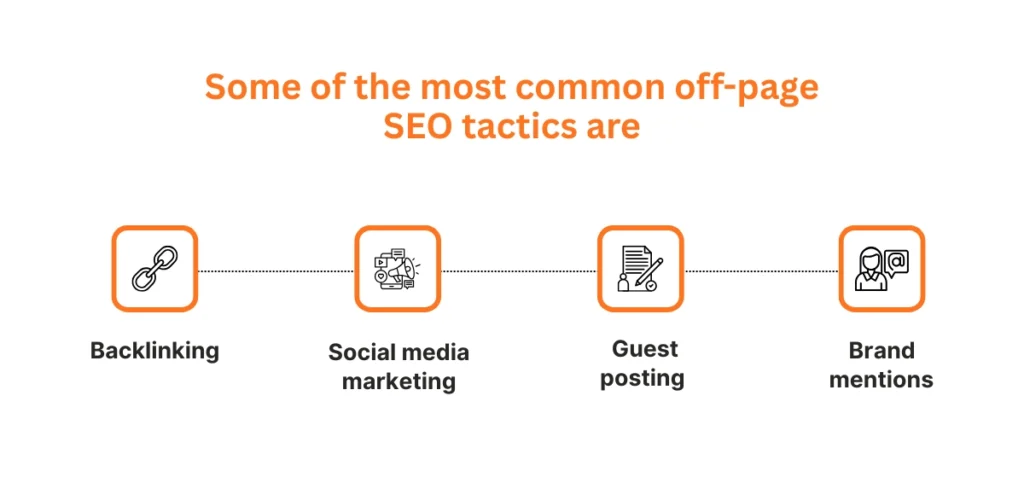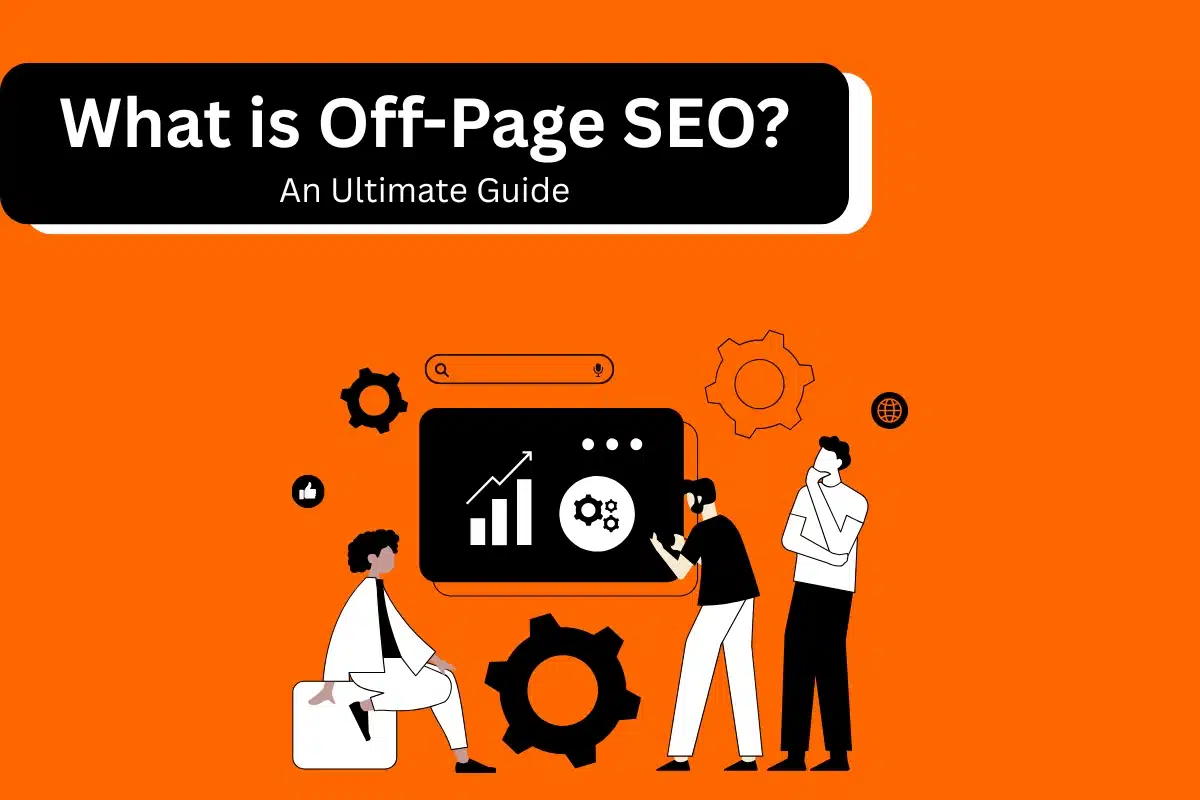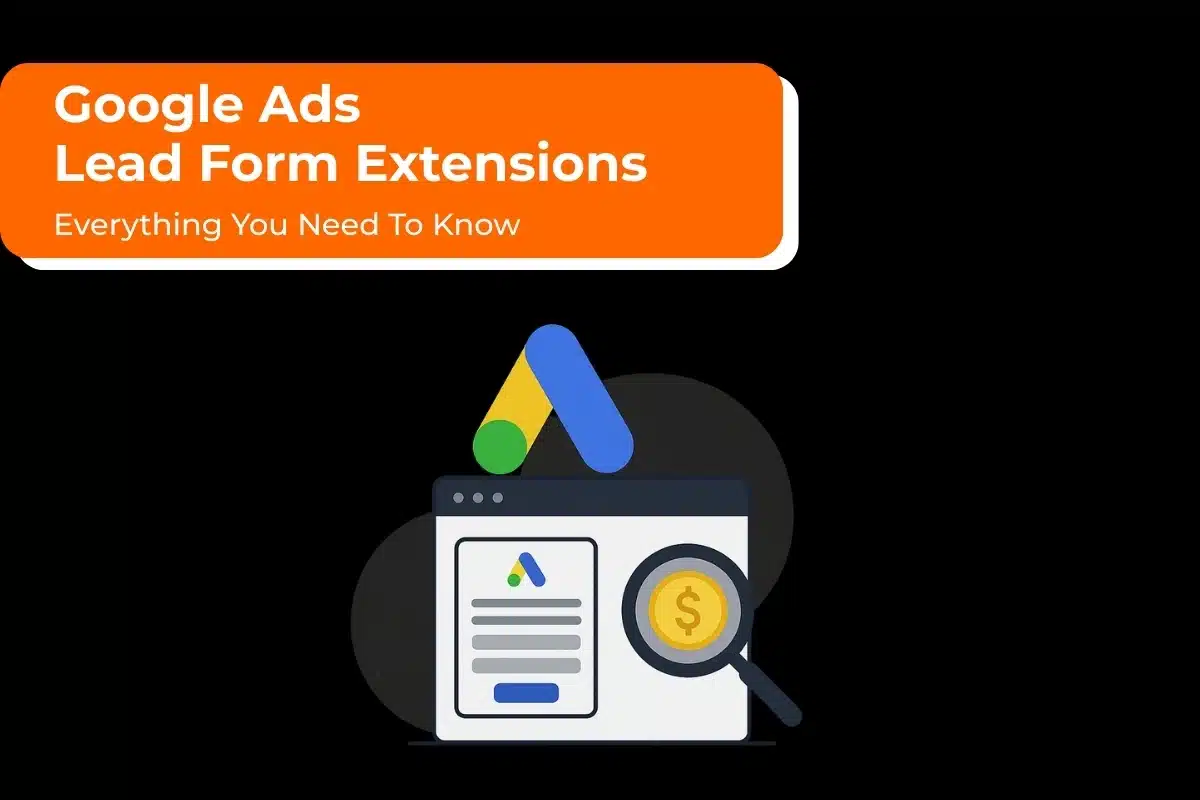Do you want to increase your brand visibility and traffic, but don’t know how? Are you stuck with the same routine of updating your website, not getting any more responses than usual? What you are lacking is a strong off-page SEO strategy, as Google doesn’t solely rank a website based on how well your on-page blogs work. In fact, according to research, Google uses more than 200 algorithm factors to decide which website to rank.
However, for more businesses, it is tough to distinguish between on-page and off-page SEO. This blog is for those who are unsure about the basics of off-page SEO and are unable to build a strong digital presence. It comprehensively explains what off-page SEO is, why it matters, and how to implement strategies that deliver results.
Off-Page SEO: A Complete Understanding
Off-page, or off-site SEO, is about optimizing your brand visibility outside the website to boost rankings and how people discover your content. It involves the efforts put into increasing organic searches without making any changes to the website itself.
Some of the most common off-page SEO tactics are:

- Backlinking
- Guest posting
- Social media marketing
- Brand mentions
All these steps help search engines see that your website is authoritative and trustworthy.
Now, many of you might still question why I can’t drive organic traffic without this SEO practice. The answer is, you can. However, Google uses several factors to evaluate the relevance and credibility of the website. To improve a website’s search engine ranking, it confirms the following:
- Linking website relevance
- Anchor text of the backlink
- Overall domain authority
Why Off-Page SEO Matters?
The Digital landscape is competitive, and to stand out, you cannot solely rely on on-page SEO. You have to strike a balance between both search engine optimisation methods. Here’s why your website cannot achieve visibility and credibility without off-page SEO:
Boosts Rankings
Search engines like Google assess whether other reputable sources have mentioned the particular website or not. For example, you are a data cleansing service provider, and other credible websites have mentioned you in their blogs, linking back to your official website. Now, Google understands that you are trusted and matches a user’s query who is looking for the said services. The link will expose you to a larger audience and drive referral traffic.
Influences Domain Authority (DA)
Moz developed the concept of DA, a predictive score that estimates how likely your website is to rank on the SERPs. Ranging from 1 to 100, the higher the score, the better the chances of ranking. Now, when other websites with high DA mention you:
- Your referral traffic increases
- Trust and relevance improve
- Your DA score directly increases
Improves E-E-A-T
One of the vital factors Google uses to determine your content quality is E-E-A-T (experience, expertise, authoritativeness, and trust):
- Does your website showcase a first-hand experience on the topic?
- Has your website content come from an expert source?
- Is your site trusted on the topic discussed?
- Is your content reliable and accurately sourced or written?
Also Read: How Much Does SEO Optimization Cost in 2025?
Off-Page SEO Strategies
These off-page strategies help build site authority and increase organic traffic:
Content Marketing
Create and publish high-quality, informational content to attract the target audience. Some of the beneficial content marketing strategies include:
Guest Posting
Guest posting is a sneaky strategy to build credibility through third-party websites’ DA. A backlink through another website helps build new relationships and drive organic traffic. However, remember that the website you choose should be relevant to your niche; otherwise, you will not draw the right audience.
To find the appropriate GP opportunity, use Google Search, and look for:
- “(Niche) write for us”
- “(Niche) guest post”
- “guest post opportunities (niche)”
Remember that every website has its own set of rules for guest posting, which have to be strictly followed.
User-Generated Content on Forums
Public forums like Quora and Reddit act as holy grails for online browsers today. You can either engage in ongoing discussions and indirectly mention your brand. Else, you can start an open-ended thread to share insights and Q&A. The best approach to attract an audience via forums is:
- Provide in-depth knowledge instead of promotion
- Link to relevant sources for credibility
- Engage constantly to build a reputation
Content Repurposing
Solely uploading new content every day might not expand your reach, and that’s where content repurposing helps. Modifying existing content to suit different platforms can benefit you quickly:
- Turn your blog’s key points into YouTube scripts
- Elaborate on extensive topics through webinars and podcasts
- Share quick key takeaways on X, LinkedIn, and Instagram for better social media reach
Since today’s audience’s reading attention span is limited, visuals can help connect with them easily.
Social Media Marketing
When profiles repost your content, your chances of gaining immediate traffic increase. Let’s take an example of a viral Instagram reel. Suppose your brand initiated it and now every content creator is reposting it, just for fun. In that case, you can maintain an active social media profile without much effort.
Influencer Marketing
In today’s world, content creators are all the rage, and they can make or break your internet presence. Their promotional content for your brand can help tap into their audience, earning you attention and backlinks. Here’s how you can use influencer marketing to your advantage:
- Partner with relevant (niche-specific) influencers
- Ask them to create product reviews and video testimonials, linking to your website/social media page
- Use endorsements to encourage organic mentions
Podcasts
Creating a podcast helps engage with the audience and drive organic traffic. Sharing your expertise instills confidence that you know all about what you are selling. Here’s how you can use podcasts and webinars for maximum impact:
- Promote sessions on social media
- Collaborate with industry experts for credibility
- Repurpose content for maximum audience reach
Link Building
Link building is a prominent step to improving domain authority and SERPs. It involves third-party websites hyperlinking to your own and increasing your relevance. Here are some of the strategies you can implement:
Peer Validation
Although links are crucial to off-page SEO strategies, even unlinked mentions can also improve your site’s reputation. According to the Google User Content guidelines, peer validation is one of the authentic indicators for brand credibility. Here’s how reliable brand mention can help increase your SERPs:
- Reinforces a brand’s reputation
- Indicates credibility and authoritativeness
- Drives direct traffic
Here’s how your brand can receive validation:
- Build relationships with influencers and industry experts
- Keep a tab on unlinked mentions via Google Alerts
- Connect with websites that have mentioned you and request a backlink, if possible
Digital PR
Digital PR, similar to the traditional approach, means media coverage through journalist reach, press releases, and newsworthy information. However, the digital method is used to develop backlinks and brand mentions for improved search rankings. Here’s how you can develop a digital PR:
- Connect with reporters who are seeking expert quotes
- Produce reports, studies, and surveys that reporters find credible
- Contribute your insights on trending issues
Broken Link Building
Suppose a third-party website has linked your web page. However, that link is exhausted or broken. This broken link issue can result in a poor user experience. Therefore, it is imperative to keep a check on every backlink and replace those which are inactive. Here is how you can do it:
- Find the broken links through an online tool (like Moz Link Explorer)
- Contact the website owner/person in contact to replace the link
Local SEO
Local SEO is an integral part of the off-page process and is specifically essential for brands that rely on onsite customers. Some of the most common businesses with a local presence are retail stores, restaurants, and service providers.
Google Business Profile
The most crucial step in improving the brand visibility in a specific geographic location is creating a GBP. It helps in maintaining a credible storefront with details so your customers can get in touch. Here’s how you can do it:
- Keep business details accurate and updated
- Upload high-quality images of the physical location
- Add your business to the relevant category(ies) for better search visibility
- Use Google Posts for promotional and event-related content
- Include an attractive and interactive description with target keywords
Citations
List your business details (citations) online, including complete name, address, and phone number. An updated NAP across search engine directories help showcase your legitimacy and improve local search rankings. A few ways to update your citations are as follows:
- Consistency across platforms
- Listing business in directories like Yelp and industry-specific sites
- Use online citation tools to manage your listings
Local Reviews
Customers trust existing reviews more than anything else. In fact, according to the Harvard Business Review report, 98% users depend on online reviews for a purchase decision. Some have even stated that not product descriptions, but reviews are the most crucial factor. Therefore, it is evident that collecting feedback is a priority for improving your business’s credibility and worth. Here’s how you can generate positive reviews:
- Request buyers to drop a review on Google
- Personally respond to positive and negative reviews
- Leverage positive reviews as a marketing tool to instil a good image in front of the customers
Taking care of this off-page SEO checklist can be time-consuming and requires expertise and constant upscaling. Therefore, several businesses leverage SEO services through an agency that is well-versed in the off-page tactics and can deliver real-time results.
Which Links Improve Off-Page SEO for Your Company?
As discussed above, it is evident that link building is crucial to improving your off-page SEO. However, there’s not just backlinks that you need to take care of. Here are three types of links that help put your website on top of the SERPs:
- Natural Links: As the name suggests, this link comes to your website organically. There’s no action, research, or outreach used to produce the backlink. In some cases, the third-party website may decide to link its content to your web page for credibility.
- Built Links: The link is established through outreach. Your team has dedicatedly reached out to websites, publishers, or journalists in the hope that they will promote your content. Another method is promoting content through an ad campaign so people can discover you on online platforms.
- Created Links: Links generated through self-submissions in forums or directories are known as created links. Since there is no outreach involved, search engines don’t appreciate this link-building tactic. Therefore, it is commonly known as the black-hat SEO practice.
Which Factors Influence the Link Value for an Off-Page SEO Strategy?
Did you know, your site can also attract low-quality links from unreliable and spammy websites? They will not help improve your SEO strategy, and on the contrary, can even harm it. Therefore, it is imperative to focus on your off-page link-building strategy so your business ranks well. Here are the key factors you need to assess to ensure that the link is of high value:
- The correct anchor text is used for linking
- The age of the link attached to your website
- The number of links available on the page
- The relationship between site’s niche and yours
- Whether the third-party website is trustworthy or not
- The domain authority of the third-party site and your linking page
Conclusion for Off-Page SEO Strategy
In 2025, leveraging off-page SEO helps search engines determine the credibility of your website and the content within. The result will be better search engine rankings, stronger brand awareness, and increased organic traffic. Some of the off-page SEO quick wins include:
- Pitching one guest post weekly (not to a single website)
- Monitor brand mentions through Google Alerts
- Share your blog post on more than three platforms
- Repurpose your blog post into a YouTube video or LinkedIn update
Improving the website authority requires constant effort, which isn’t possible for most companies. Therefore, an SEO agency aids in streamlining your plan and implementing proven off-page strategies.
Ready to improve your search presence? Hire a trusted agency and boost your visibility.
FAQs
1. What is the difference between an off-page and an on-page strategy?
On-page SEO involves enhancing the user experience for your website. However, off-page SEO helps build credibility across the internet through third-party sites.
2. Do I have to invest in off-page SEO continuously?
Yes, you have to work diligently on off-page SEO strategies to maintain your brand’s credibility.
3. How can I get high-quality backlinks?
You can achieve good backlinks by connecting with industry-specific websites that already have an established reputation online.
4. What is an anchor text used for link building?
The anchor text is the phrase where you can hyperlink your own web page. This link building helps visitors directly reach your page without browsing for it online.
5. How can I replace broken links from other websites?
You can replace the broken links by contacting the person who has the authority for the website content updation.






